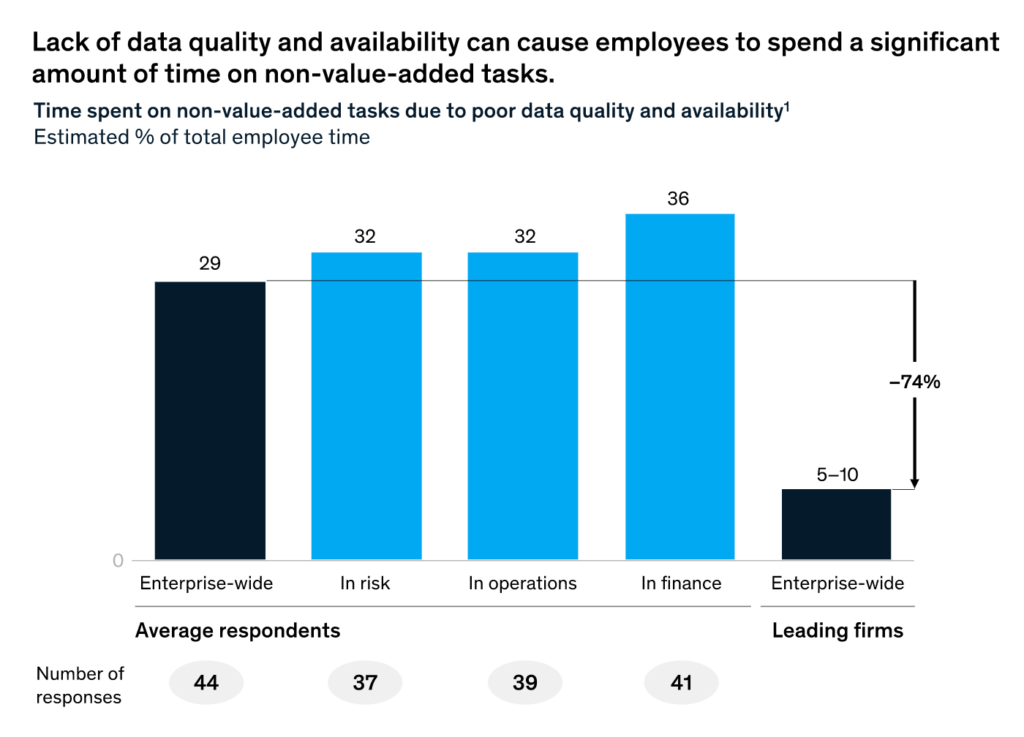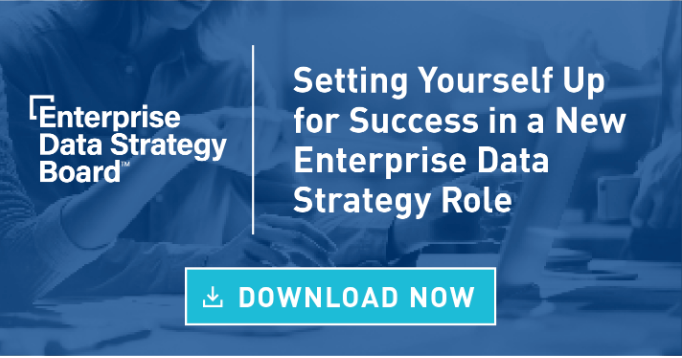Highlights:
- A data governance council can be an effective tool in strategizing your governance program, raising internal awareness, and prioritizing work.
- Your governance council should include representatives from key business units such as marketing, sales, human resources, or any team that utilizes data.
- It’s effective to build your council around specific use cases and align the council’s objectives with a larger enterprise initiative.
- Marketing your council and program is a constant journey and essential in securing executive support and buy-in.
Today, every enterprise understands the transformative potential of data and analytics, but in order for data to propel innovation and revenue, it needs to be of high quality.
The 2019 McKinsey Global Data Transformation survey found that on average 30% of productive time is spent on non-value-added tasks due to poor data quality and availability.

“Data processing and cleanup can consume more than half of an analytics team’s time, including that of highly paid data scientists, which limits scalability and frustrates employees,” McKinsey reported.
In order for an enterprise to ensure the availability and quality of data, they need to implement effective data governance, and a data governance council or committee is a key component of that organizational structure.
Collibra defines a data governance council as a “governing body for strategizing governance programs, raising awareness of its importance, approving enterprise data policies and standards, prioritizing related projects, and enabling ongoing support.”
When leveraged correctly, your data governance council can help you prioritize work, spread awareness, and serve as the backbone of your governance program.
Still, how do you actually build a council and ensure it’s steered in the right direction? Let’s dive in.
Building your council
Your data governance council needs to include representatives from core enterprise units such as marketing, sales, and HR — any team that relies on data to perform their jobs. McKinsey also suggested positioning your data governance council within senior management and, in some cases, even including members of the C-suite themselves.
Still, every employee has their own set of responsibilities to worry about, so how do you find willing participants?
Michele Koch, Enterprise Data Strategy Board alumna and Senior Director of Enterprise Data Intelligence at Navient, shared how she found these data stewards in the Enterprise Data Strategy Board guide, “Setting Yourself Up for Success in a New Enterprise Data Strategy Role.”

Michele advised leaders to “follow the breadcrumb trail” by asking team members who they turn to within the enterprise when they have data-related questions. Look for those employees who have already expressed enthusiasm toward working with data.
Not only should these council members be passionate about data but they will also need to have strong communication skills, according to Michele. These employees will serve as the connection between your data governance policies and the enterprise to further encourage adherence.
“If they’re not good at getting the word out or involving other people, that communication path can break down,” Michele said. “I really think that’s part of their job — to be the conduit between different lines of business.”
Michele also highlighted the importance of setting clearly defined roles and responsibilities to ensure members understand what’s expected of them and the council operates smoothly.
Defining the scope and purpose
When it comes to defining the purpose of your governance council, it’s most effective to set specific use cases based on the most pressing issues within the enterprise.
Michele said, “You have to have a business need or some strategic initiative that you can tie it to. [For example], in order to implement this new marketing strategy, we’re going to need to clean up this data.”
In order to determine the governance objectives, American Fidelity Insurance Chief Data Officer Ryan Doupe said during a DATAVERSITY Conference data leaders must collect input from key enterprise stakeholders.
Ryan advised data leaders to explore why data is important to the company. Whether it’s improving analytics, making data-driven decisions, or changing the company’s business model, it’s important to craft a “future state” vision statement to guide you, he said.
Securing C-suite support
When the goals of your data governance council and program are closely aligned with the overall enterprise goals, you’re also more likely to attract C-suite support.
Top-down buy-in and empowerment are critical to the success and sustainability of your governance council. If you’re asking team members to contribute their time as data stewards, then they need to see that the work they’re doing is important to the company.
Michele said your governance framework should be tied to one of three general corporate objectives — increase revenue, decrease costs or complexity, and reduce risk.
Still, demonstrating precise ROI can be challenging, particularly when you’re early on in this journey. In this case, highlighting time saved or risk mitigation can make for a solid strategy.
Michele also advised data leaders not to forgo the importance of marketing their program, which she said is a constant effort.
“You constantly have to keep saying, ‘We’re here, and this is what we did, and this is how we’re helping the company,’ so you keep getting the people and the funding. It takes a lot more time than you’d ever think, but it’s very important to do.”
Michele Koch, Navient
Training employees
It’s clear that the effectiveness of your data governance council hinges on your data stewards, and you need to ensure they have the knowledge and resources needed to be successful.
This is why during the Enterprise Data World Conference, Ryan said training is such a crucial step in this process. Remember, a majority of your governance council members have responsibilities outside of governance, so it’s important to provide them with opportunities to enhance their skills.
Additionally, this investment in training will further show your employees that the enterprise values their time and effort.
Ryan recommended holding data summit events featuring guest speakers to bring together your community of stewards.
Other training tactics can include boot camps, self-paced training, workshops, follow-up assessments, and more.
There are a number of resources dedicated to data governance, including The Data Governance Institute, The Data Management Association (DAMA), and The Business Application Research Center.
It can also be beneficial to benchmark strategies with other industry leaders. You can find these networks by joining data-specific communities like the Enterprise Data Strategy Board, which regularly hosts confidential conversations for data leaders on data governance and other prominent industry topics.


